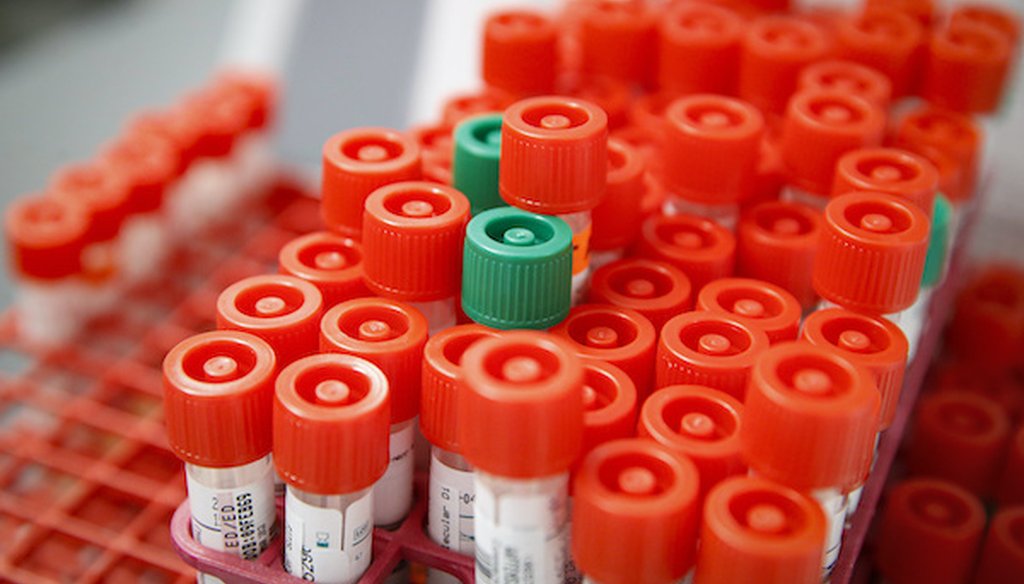Stand up for the facts!
Our only agenda is to publish the truth so you can be an informed participant in democracy.
We need your help.
I would like to contribute

A laboratory technician prepares COVID-19 patient samples for semi-automatic testing at Northwell Health Labs, Wednesday, March 11, 2020, in Lake Success, N.Y. (Associated Press)
If Your Time is short
-
Lack of testing for the novel coronavirus is being driven by supply chain problems. The U.S. outsources some of the materials it needs for testing.
-
A global run on supplies and a demand for rapidly increased production has bottlenecked the system.
-
Supply shortages vary by laboratory, and some are better off than others.
-
Other factors include a lack of preparation and a disorganized national response.
It’s been over three months since the first COVID-19 case was confirmed in the United States, yet the country still continues to struggle to bring testing up to scale.
Some labs don’t have the supplies they need to complete tests. Part of the problem is that the U.S. has outsourced production of some testing materials to other countries, making them harder to obtain. But that’s not the only issue that separates Americans from widespread testing, experts say.
Other obstacles? A lack of preparation, early missteps and a disorganized, fragmented national response.
The shortage is made worse by an instantaneous worldwide demand for the same supplies, which has bottlenecked a complex international supply chain.
Put it all together and it means that testing is still far behind where it should be, according to public health experts.
A supply chain is a link of companies that make, transport, refine and deliver a finished product. A shut down anywhere in the process stops the flow. For coronavirus testing, the supply chain includes swabs for scraping cells from people’s noses, test tubes to put the cell sample in, chemicals to preserve the specimen, and more chemicals to test and detect the presence of the virus. Lose a link and the chain is disrupted.
Nada Sanders, professor of supply chain management at Northeastern University, told PolitiFact that most supply chains aren’t simple and linear, and that they can quickly get complicated for products that have many parts.
"Consider that just one of the chips that run an iPhone is designed in California, made in Taiwan, tested in the Philippines and then added to Apple products in China," Sanders said.
"Production of some components is difficult to scale up and they create bottlenecks — which is like a pinch point in the flow."
She added: "That is exactly why there is a shortage of test kits and all the components that go into it. It is actually a complex supply chain with many entities — test kit manufacturers who also make machine-specific reagents, private and public labs, suppliers of needed components such as swabs, etc."
Louise Serio, a spokesperson for the American Clinical Laboratory Association, whose members include Quest and LabCorp, also said the shortages are constantly changing.
"At one point it was test kits, at another it was swabs," Serio said. "But one constriction in the chain of supply can suddenly create a bottleneck. That's why it's important that labs have reliable access to all of the supplies and equipment necessary to perform the tests."
The laboratory equipment used to perform tests are typically called testing platforms, and different platforms sometimes require different supplies.
RELATED: Donald Trump exaggerates number of untapped coronavirus testing labs
Some of the supplies needed for testing, like a lot of the kits, come from Europe, but other supplies might be sourced from India, Italy, China, or the United States. Some manufacturers may be small operations, while others are producing in bulk.
Michael Bevan, director of supply chain services at ARUP Labs, told PolitiFact that each testing platform has specific test kits, which are the components typically tied to the manufacturing company (i.e, Abbott, Roche, Hologic).
"The components for the test kits are typically manufactured in the United States and Europe by the company that the laboratory has chosen to use," Bevan said. "I am not aware of any of the components for the COVID testing platforms that are being manufactured in China."
But all tests need some form of reagents, which is a broadly used term that refers to key chemical ingredients used in various tests.
Bevan said it’s true that the "general" reagents, or the raw components to make those reagents, are commonly produced in China for bulk supply, with some manufacturing taking place in the U.S. for smaller volumes.
RELATED: Swabs and reagents: The coronavirus test materials everyone is talking about
But not all labs are short of reagents.
Christopher Zavala, the business director for Northwell Health Labs, a New York City-area health system, said his labs’ supply limitations are on the collection side, like the swabs used to take samples from people.
"They've always been sourced from overseas," Zavala said. "A lot of them come from international destinations. Some of the first swabs we got came from Italy. A large quantity of swabs come from China."
Davey Smith, chief of infectious diseases and global public health at the University of California-San Diego, also told us that various testing supplies come out of China.
"A lot of the supplies come from China, and I think India makes a ton of them. But China for sure," Smith said. "We can make them (reagents) in the lab – I've made them before. But to any scale, it’s all about the cheaper option. For the same reason that our iPhones are made in China, these chemicals are made in China."
Lab officials say that some of the major testing manufacturers are based overseas and typically make the majority of their products near, or around, their headquarters.
Adm. Brett Giroir, the Trump administration’s Assistant Secretary for Health, recently talked about this, telling the Wall Street Journal that important suppliers are primarily overseas.
"I can invade Germany if I want to get Qiagen," Dr. Giroir told the newspaper, referring to a key factory for Qiagen NV, a Dutch testing-chemical producer. "But I can’t do anything aside from that."
Roche, for example, is one of the largest biotech companies in the world and develops pharmaceuticals and diagnostics. They’re based in Switzerland. Siemens Healthineers, another major medical technology company, is headquartered in Germany.
Both companies have manufacturing plants all over the world, including in the U.S.
Michael Weist, a spokesperson for Roche, told PolitiFact that the launch of its coronavirus diagnostic test has been a global effort, with some components manufactured in the U.S., and others overseas.
Roche’s coronavirus test was developed in California and is being produced in its molecular diagnostics facility in New Jersey, Weist said. The tests are shipped around the world from the company’s distribution facilities in Indianapolis and Mannheim, Germany.
The system the test runs on, meanwhile, is produced in Switzerland. Components, such as reagents, are part of the firm’s global supply chain network, and Roche manufactures all reagents for their testing, including the raw materials.
Labs work with suppliers to get testing materials, and although all these facilities are placing orders for materials to perform coronavirus testing, they have different needs.
Some labs only require certain raw materials and can do the rest in-house. But smaller labs or hospitals may have to order more specialized supplies.
Bevan explained that each testing platform typically has multiple reagents. Some reagents are unique, while others are more common and can be used for different tests.
Bevan said some larger labs in the U.S., like ARUP’s, have the ability to purchase and formulate general reagents from raw materials in-house, and said it’s likely the reason why they didn’t see a disruption in the supply chain for these materials.
Northwell’s labs are a good example of a system that’s doing relatively OK now, in part because they placed orders early and with multiple vendors, Zavala said, but also because they're using different types of processing machines, and a 3D-printing division to make swabs.
He said that getting enough reagents is still an issue, but the situation is improving each week and, overall, the system is in a good spot, and currently has enough supplies to meet local demand.
The United States’ testing woes kicked off with a late and failed rollout of testing kits from the Centers for Disease Control and Prevention. The kits turned out to be faulty and forced the CDC to recall the tests.
Another blow, some experts say, was a lack of foresight going back years.
Smith pointed out that the U.S. has strategic emergency reserves of items like oil and milk, but didn’t treat testing components the same way. There was no emergency supply of swabs or reagents.
"We as a government, as a people, said it’s important to have this capacity, and so we make too much of certain things, because we know there are emergencies that might happen," Smith said. "But we didn't do the same in this arena. We didn't make enough supplies, like reagents, to have on hand in case of an emergency."
In response to the virus, the federal government has attempted to build up various areas of testing, such as directing U.S. companies to start making certain materials, removing red tape to speed up efforts, and introducing testing material alternatives, like different types of swabs.
But, unfortunately, officials say it’s too little too late.
"In this case, pure outsourcing is not the problem. Rather it is a surge of demand, lack of ramp up early on, and lack of coordination on a national level," Sanders said.
"The solution that would have solved all of this is a nationally coordinated effort to organize the production and assembly of all the pieces that need to come together – from the private and public labs and production sources. This is Supply Chain 101. Without this coordinated effort it has become akin to herding cats. This has resulted in a disorganized mess."
Our Sources
New York Times, In Scramble for Coronavirus Supplies, Rich Countries Push Poor Aside, April 9, 2020
Wall Street Journal, Coronavirus Testing Hampered by Disarray, Shortages, Backlogs, April 19, 2020
PolitiFact, Swabs and reagents: The coronavirus test materials everyone is talking about, April 21, 2020
Phone interview, Dr. Davey Smith chief of Infectious Diseases & Global Public Health as UC San Diego, April 21, 2020
Phone Interview, Christopher Zavala director of business development & marketing at Northwell Health Labs, April 23, 2020
Email interview, Michael Bevan director of supply chain services at ARUP, April 26-27, 2020
Email interview, Nada Sanders professor of supply chain management at Northeastern University, April 26, 2020
Phone and Email interview, Louise Serio spokesperson for the American Clinical Laboratory Association, April 24-27, 2020
Email interview, Michael Weist Communications Business Partner at Roche Diagnostics Corporation, April 27, 2020








































